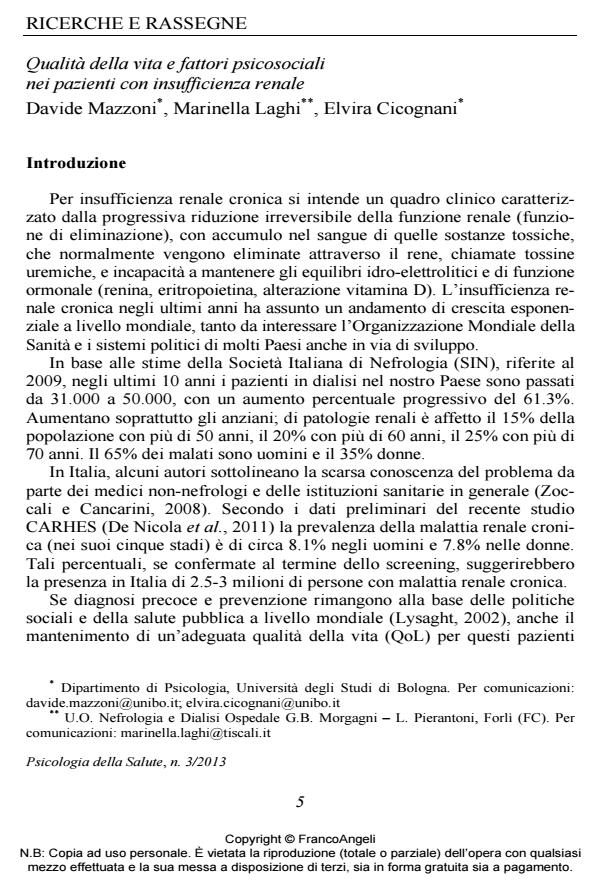Qualità della vita e fattori psicosociali nei pazienti con insufficienza renale
Titolo Rivista PSICOLOGIA DELLA SALUTE
Autori/Curatori Davide Mazzoni, Marinella Laghi, Elvira Cicognani
Anno di pubblicazione 2013 Fascicolo 2013/3
Lingua Italiano Numero pagine 23 P. 5-27 Dimensione file 426 KB
DOI 10.3280/PDS2013-003001
Il DOI è il codice a barre della proprietà intellettuale: per saperne di più
clicca qui
Qui sotto puoi vedere in anteprima la prima pagina di questo articolo.
Se questo articolo ti interessa, lo puoi acquistare (e scaricare in formato pdf) seguendo le facili indicazioni per acquistare il download credit. Acquista Download Credits per scaricare questo Articolo in formato PDF

FrancoAngeli è membro della Publishers International Linking Association, Inc (PILA)associazione indipendente e non profit per facilitare (attraverso i servizi tecnologici implementati da CrossRef.org) l’accesso degli studiosi ai contenuti digitali nelle pubblicazioni professionali e scientifiche
Il disturbo renale e i relativi trattamenti possono compromettere le attività quotidiane dei pazienti; tuttavia non è ancora chiaro l’impatto che essi producono sulla qualità della vita (QoL) e il ruolo giocato dai processi psicosociali. Il primo obiettivo di questo lavoro era valutare, mediante questionario selfreport, la QoL (misurata con il WHOQOL-Breve) e il benessere psicologico di un campione di pazienti con insufficienza renale cronica in rapporto ad alcune variabili sociodemografiche (genere, età) e alla condizione terapeutica (emodialisi, dialisi peritoneale, post-trapianto). In secondo luogo, nei pazienti in dialisi si voleva verificare l’impatto di alcune variabili psicosociali, quali le rappresentazioni della malattia, le strategie di coping e la rete sociale supportiva, sulla QoL e sul benessere psicologico. Il campione è composto da 104 pazienti in dialisi (emodialisi e peritoneale) e 34 che hanno ricevuto il trapianto di reni. I pazienti dializzati evidenziano livelli di QoL inferiori a coloro che hanno ricevuto un trapianto di rene, in diverse aree della QoL, mentre le differenze in base al tipo di dialisi non risultano statisticamente significative. I risultati indicano che, nei pazienti in dialisi, una visione della malattia come controllabile, l’uso di stili di coping attivi e la percezione di un’ampia rete sociale supportiva sono fattori che favoriscono la QoL. I risultati dello studio hanno importanti implicazioni sul versante clinico e della prevenzione.
Parole chiave:Qualità della vita, dialisi, rappresentazioni di malattia, coping, sostegno sociale, trapianto di rene.
- Health Literacy Emanuela Saita, Susanna Zanini, Enrico Minetti, Chiara Acquati, pp.306 (ISBN:9781522519287)
- Transformative Healthcare Practice through Patient Engagement Emanuela Saita, Susanna Zanini, Enrico Minetti, Chiara Acquati, pp.1 (ISBN:9781522506638)
- COPE-NVI-25: validazione italiana della versione ridotta della Coping Orientation to the Problems Experienced (COPE-NVI) Luca Caricati, Chiara Foà, Laura Fruggeri, Annalisa Tonarelli, in PSICOLOGIA DELLA SALUTE 2/2015 pp.123
DOI: 10.3280/PDS2015-002007
Davide Mazzoni, Marinella Laghi, Elvira Cicognani, Qualità della vita e fattori psicosociali nei pazienti con insufficienza renale in "PSICOLOGIA DELLA SALUTE" 3/2013, pp 5-27, DOI: 10.3280/PDS2013-003001